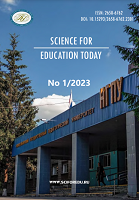Использование педагогических технологий в развитии аксиологического потенциала личности студентов (на основе освоения этнокультуры Крыма)
The use of educational technologies for the development of students’ axiological potential (based on studying the ethnoculture of the Crimea)
Author(s): Irina A. Zakiryanova, Alla MikhaylovaSubject(s): Cultural Anthropology / Ethnology, School education, State/Government and Education, Social Theory, Sociology of Culture, Sociology of Education, Pedagogy
Published by: Новосибирский государственный педагогический университет
Keywords: Axiological potential of personality; Spiritual and moral development; Student-centered technologies; Ethno-cultural heritage; Crimean region;
Summary/Abstract: Introduction. The article presents a study on the problem of designing educational activities that contribute to spiritual, moral and patriotic education of the younger generation, aimed at preserving culture, historical memory, and continuity of generations. The purpose of the research is to uncover and prove the capacity of student-centered technologies for the development of students' axiological potential during the study of Crimean ethnoculture. Materials and Methods. The study follows the axiological approach, from which the assessment of the educational capacity of the Crimean ethnoculture for spiritual and moral formation of the individual was made. Psychodiagnostic techniques were used to assess students' understanding of the main indicators of spiritual and moral development. The sample consisted of 1st and 2nd year undergraduate students of the Polytechnic Institute of Sevastopol State University, majoring in Technosphere safety. Results. The article reviews the research on the issues of spiritual and moral education in modern conditions and the problem of developing the axiological potential of the future professional. It should be noted that in modern conditions the problem of creating important life values (citizenship and patriotism, spirituality and morality, respect) are strategic priorities of social development. The authors emphasize that the self-understanding of a person as part of their nation and the formation of historical memory are based on the development of ethnoculture. This study substantiates that the Crimean region is a special socio-cultural platform favorable for the education of new generations on the basis of its specificity, contained in the ethno-cultural heritage. The authors argue that the educational environment of the university, including the use of studentcentered technologies, ensures the development of individual’s axiological potential (realizing life purposes, moral meanings and sources of spiritual development). Conclusions. The authors come to the conclusion that developing axiological potential of students on the basis of studying Crimean ethnoculture contributes to the formation of a humanistically oriented personality, ready for intercultural dialogue, open to interaction and cooperation with people of different nationalities and faiths in the single multicultural ethnic society.
Journal: Science for Education Today
- Issue Year: 13/2023
- Issue No: 1
- Page Range: 65-83
- Page Count: 19
- Language: Russian

